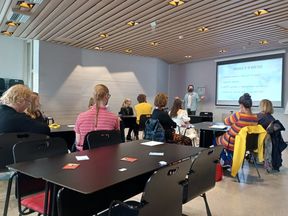Blog: LGBTQ+ in Aalto

Authors: Irpo Niemenmaa and Ninni Laaksonen, GAYY ry
Aalto University aims to create an equal and inclusive space for all, students and staff alike. One way in which this can be done is by actively discussing the themes through which these values can be achieved. Within the framework of the Oasis of Radical Wellbeing project in Aalto, monthly EDI sessions are organized for Aalto staff, where they can discuss and learn new things about different EDI topics, facilitated by experts.
Aalto University's Equality, Diversity and Inclusion Plan, or the EDI Plan, aims to build exactly that, an increasingly equal, diverse and inclusive Aalto community. In the September EDI session for Aalto staff, the theme was LGBTQ+ at Aalto and the speakers were Kasper Kivistö from Trasek ry and the board of GAYY ry. Trasek ry is a national association that promotes the fundamental and human rights of sexual minorities, opposes discrimination and participates in the development of the healthcare system. GAYY ry is an LGBTQ+ organization based in Aalto University. It’s role in the Aalto community is to organize events and advocate for students' rights at Aalto University.
The autumn session was opened according to principles of a safer space where, among other things, the participants were urged to keep an open mind and appreciate other people's identities. These principles were used to agree on common ground rules and to listen respectfully to others. After that, the participants moved on to discuss the correct vocabulary to use when talking about other people in their working and study life.
During the session, Kasper Kivistö went through the problems regarding outdated vocabulary in everyday life, the diversity of gender and sexual identities and how to discuss these issues. The session emphasized that the mistakes you make in everyday life can, in fact, be a gift and an opportunity to learn something new and correct your own prejudices. One good takeaway from this was that it is good not to overreact when you make mistakes, but instead to say Thank You! and continue the conversation as normal.
GAYY also brought up the students' perspective on the topic. During GAYY's presentation, such issues were raised as the challenges students face in their everyday lives in relation to the gendered digital systems within Aalto, the offensive language students encounter in their everyday lives and heteronormative assumptions in everyday discourse. Raising these issues was important for GAYY, as bringing students' problems to the attention of Aalto staff is one step towards creating a more equal community.
Kasper Kivistö led the session with empathy and made the event feel safe and comfortable. This was also reflected at the end of the session when participants discussed in small groups. The discussion was lively and encouraged participants to think about how to make Aalto a more equal community.
The EDI session we attended was a step towards a more equal Aalto community. Through this shared discussion, we created understanding between people. To build a more equal working and learning community, all participants need to have the vocabulary necessary to facilitate discussions. We believe events like this shed light on the perspective of LGBTQ+ students and employees. Our common goal is to enable everyone to have a safe and enjoyable learning and working experience at Aalto.
We dream of a future where events like this are commonplace. The university needs to support its student minorities and employees more visibly. EDI issues should not only be reflected in voluntary training, but during every lecture, in the university infrastructure and in funding decisions. As students, we still too often encounter dismissive and even negative attitudes towards minorities.
Here are a few rules of thumb on how you can make our university a safer place:
- Don't assume a person's gender or other identity. Rather, assume that there will always be minorities in the audience. Chances are, there are.
- People belonging to minorities are more than their minority identity. They have hobbies, favourite foods, and special interests, just like everyone else.
- Mistakes are good learning experiences. If you are corrected, e.g., about your language or other activities related to minorities, it is a good learning experience. Better next time!
Sources: trasek.fi, (3.10.2022)






